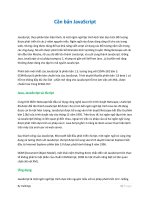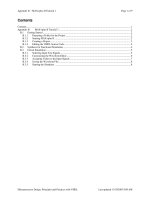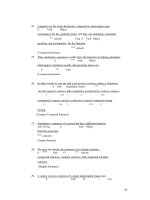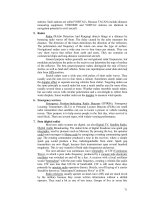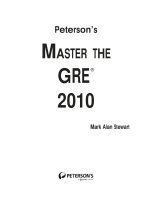Tài liệu Common erros in English part 1 doc
Bạn đang xem bản rút gọn của tài liệu. Xem và tải ngay bản đầy đủ của tài liệu tại đây (551.7 KB, 15 trang )
Quick
Solutions
to
Common
Errors
in
English
If
you
want
to
know how
Improve Your
Punctuation
&
Grammar
Master
the
basics
of the
English
language
and
write
with greater
confidence
Improve Your Written English
Master
the
essentials
of
grammar,
punctuation
and
spelling
and
write with greater
confidence
Writing
an
Essay
How
to
improve
your
performance
in
coursework
and
examinations
Write
with Confidence
Solutions
and
examples
for
everyday
writing
needs
The
Handbook
of
English
Punctuation, common practice
and
usage
For
full
details, please send
for a
free
copy
of
the
latest catalogue
to:
Spring Hill House, Spring Hill Road,
Oxford
OX5
1RX, United Kingdom
www.howtobooks.co.uk
howtobooks
howtobooks
Quick Solutions to
Common
Errors
in
nglish
E
Angela Burt
An A-Zguide
to spelling
punctuation
and grammar
Published by How To Content,
A division of How To Books Ltd,
Spring Hill House, Spring Hill Road,
Begbroke, Oxford 0X5 1RX. United Kingdom.
Tel: (01865) 375794. Fax: (01865) 379162.
email:
All rights reserved. No part of this work may be reproduced or stored in an
information retrieval system (other than for purposes of review) without the express
permission of the publisher in writing.
The right of Angela Burt to be identified as the author of this work has been
asserted by her in accordance with the Copyright, Designs and Patents Act 1988.
© Copyright 2004 Angela Burt
First published in paperback 2004
First published in electronic form 2007
ISBN: 978 1 84803 091 6
Cover design by Baseline Arts Ltd, Oxford, UK
Produced for How To Books by Deer Park Productions, Tavistock, Devon, UK
Typeset by PDQ Typesetting, Newcastle-under-Lyme, Staffs, UK
NOTE: The material contained in this book is set out in good faith for general
guidance and no liability can be accepted for loss or expense incurred as a result of
relying in particular circumstances on statements made in the book. The laws and
regulations are complex and liable to change, and readers should check the current
position with the relevant authorities before making personal arrangements.
Introduction
Quick Solutions
to
Common Errors
in
English
is a
reference
book which
has
been written
for the
student
and the
general reader.
It
aims
to
tackle
the
basic
questions
about spelling, punctuation, grammar
and
word usage that
the
student
and the
general reader
are
likely
to
ask.
Throughout
the
book there
are
clear explanations,
and
exemplar sentences where they
are
needed. When it's
helpful
to
draw attention
to
spelling rules
and
patterns,
these
are
given
so
that
the
reader
is
further
empowered
to
deal with hundreds
of
related words.
The aim
always
has
been
to
make
the
reader more confident
and
increasingly self-reliant.
This
is a
fast-track
reference book.
It is not a
dictionary although, like
a
dictionary,
it is
arranged
alphabetically.
It
concentrates
on
problem areas;
it
anticipates
difficulties;
it
invites cross-references.
By
exploring punctuation,
for
example,
and
paragraphing,
it
goes
far
beyond
a
dictionary's
terms
of
reference.
It is
not
intended
to
replace
a
dictionary;
it
rather
supplements
it.
Once,
in an
evening class,
one of my
adult students
said,
'If
there's
a
right
way to
spell
a
word,
I
want
to
know it.'
On
another occasion,
at the end of a
punctuation session
on
possessive apostrophes,
a
college
student
said rather angrily, 'Why wasn't
I
told this years
ago?'
This
book
has
been written
to
answer
all the
questions that
my
students over
the
years have
needed
to
ask.
I
hope
all who now use it
will have their
questions answered also
and
enjoy
the
confidence
and
the
mastery that this will bring.
Angela
Burt
v
This page intentionally left blank
How
to use
this book
For
ease
of
reference,
all the
entries
in
this book have
been listed alphabetically rather than being divided
into
separate spelling, usage, punctuation
and
grammar
sections.
You
will
therefore
find
hypocrisy
following
hyphens;
paragraphing
following paraffin;
who or
whom?
following
whiskey
or
whisky?;
and so on.
Want
to
check
a
spelling?
Cross-referencing
will help
you
locate words with tricky
initial
letters.
aquaint
Wrong spelling.
See
ACQUAINT.
Plural
words
are
given alongside singular nouns, with
cross-referencing
to
relevant rules
and
patterns.
knife
(singular) knives (plural).
See
PLURALS (v).
There
is
also
a
general section
on
plurals
and
another
on
foreign
plurals.
If
it's
the
complication
of
adding
an
ending that
is
causing
you
trouble,
you
will
find
some words listed
with
a
useful
cross-reference.
dining
or
dinning?
dine
+ ing =
dining
(as in
dining room)
din + ing =
dinning (noise dinning
in
ears)
See
ADDING
ENDINGS
(i) and
(ii).
vii
How
to use
this book
There
are
individual entries
for
confusing
endings like
-able/-ible;
-ance,-ant/-ence,-ent;
-cal/-cle; -ise
or
-ize?
and for
confusing
beginnings like ante-/anti-; for-/
fore-;
hyper-/hypo-;
inter-/intra-
and
many others.
Usage?
If
you're hesitating between
two
words
in a
tricky pair
(like
contagious
or
infectious?;
disinterested
or
uninterested?;
imply
or
infer?;
irony
or
sarcasm?),
turn
to
whichever word
is
listed
first
alphabetically.
There
you
will
find a
full
explanation
of the
difference
in
meaning
and
usage. There will
be a
cross-reference
from
the
word listed second alphabetically.
misplace
See
DISPLACE
OR
MISPLACE?.
Punctuation?
The
functions
of the
different
punctuation marks
are
discussed under individual entries;
apostrophes
(');
brackets
(round
and
square);
capital
letters;
colons
(:);
dashes
(-);
exclamation
marks (!); full
stops
(.);
hyphens
(-);
inverted
commas/quotation
marks/
speech
marks (single
'' and
double
" ");
semicolons
(;);
and
question
marks (?).
Additional
entries include
commands;
contractions;
end
stops;
and
indirect/reported
speech.
As
well
as the
general entry,
contractions,
commonly used contractions
are
listed individually
as
the
punctuation
of
these causes
so
much confusion.
isn't
Place
the
apostrophe
carefully.
(not is'nt)
viii
How to use
this book
Grammar?
Many
grammatical queries
can be
listed individually
or
as
a
choice between
two or
three possibilities. Among
these are:
as or
like?;
consist
in or
consist
of?;
different
from/to/than;
due to or
owing
to?;
fewer
or
less?;
I/me/myself;
lay or
lie?;
passed
or
past?;
shall
or
will?;
should
or
would?;
who or
whom?.
between
you and I
Incorrect.
Write:
between
you and me.
See
PREPOSITIONS.
theirselves
Incorrect formation.
See
THEMSELVES.
At
other times, however, some grammatical points have
necessarily
to be
grouped under general technical
headings which sound rather forbidding. (The entries
themselves,
I
hope, will make
all
clear!)
These entries
are too
long
to be
quoted here.
I
suggest
that
you
look them
up to see
whether they deal
with areas that cause
you
problems:
comparative
and
superlative
double
negatives
nouns
paragraphing
participles
possessive
pronouns
prepositions
sequence
of
tenses
split
infinitives
subjunctive
ix
How to use
this
book
As
well
as
using this book
as a
reference text (its
unwritten subtitle
is A
Friend
at
Your Elbow!),
I
hope
you
will sometimes
be
tempted
to
browse
and to
follow
up
cross-references.
Our
language
is a
fascinating
one
and
well repays
careful
attention.
There will come
a
time when
you no
longer need
the
guidance this reference book
offers.
That will
be
real
success!
Appendices
At
the end of the
book there
are
three appendices
for
further
reference:
Appendix
A:
Literary
terms
Appendix
B:
Parts
of
speech
Appendix
C:
Planning,
drafting
and
proofreading
X
abandon
abandoned, abandoning, abandonment (not -bb-)
abattoir
(not
-bb-)
abbreviate
abbreviated,
abbreviating, abbreviation (not -b-)
abbreviations
See
CONTRACTIONS.
-able/-ible
Adjectives
ending
in
-able
or
-ible
can be
difficult
to
spell
because both endings sound identical. You'll
always
need
to be on
guard with these words
and
check each word individually when
you are in
doubt,
but
here
are
some
useful
guidelines:
(i)
Generally
use
-able
when
the
companion word
ends
in
-ation:
abominable,
abomination
irritable,
irritation
(ii)
Generally
use
-ible when
the
companion word
ends
in
-ion:
comprehensible, comprehension
digestible,
digestion
(iii)
Use
-able
after
hard
c and
hard
g:
practicable
(c
sounds like
k)
navigable
(hard
g)
(iv)
Use
-ible
after
soft
c and
soft
g:
forcible
(c
sounds like
s)
legible
(g
sounds like
j)
See
also
ADDING ENDINGS
(n);
SOFT
c
AND
SOFT
G.
1
^K^H
ABRIDGEMENT/ABRIDGMENT
abridgement/abridgment
Both
spellings
are
correct.
Use
either
but be
consistent within
one
piece
of
writing.
abscess
This
is a
favourite word
in
spelling quizzes.
(not
absess
or
abcess)
absence
absent
(not absc-)
absolute
absolutely
(not absoloute, absoloutely)
absorb
absorption. Notice
how b
changes
to p
here.
abstract
nouns
See
NOUNS.
accept
or
except?
We
ACCEPT
your
apology.
Everybody
was
there
EXCEPT
Stephen.
accessary
or
accessory?
If
you
want
to
preserve
the
traditional distinction
in
meaning
between
these
two
words,
use
ACCESSARY
to
refer
to
someone associated with
a
crime
and
ACCESSORY
to
refer
to
something that
is
added
(a
fashion
accessory
or car
accessories). However,
the
distinction
has now
become blurred
and it is
perfectly
acceptable
to use one
spelling
to
cover both
meanings.
Of the
two, accessory
is the
more widely
used,
but
both
are
correct.
accessible
(not
-able)
accidentally
The
adverb
is
formed
by
adding
-ly
to
accidental.
(not
accidently)
2
ADAPTER
OR
ADAPTOR?
accommodation
This
is a
favourite word
in
spelling
quizzes
and is
frequently
seen misspelt
on
painted signs.
(not
accomodation
or
accommadation)
accross
Wrong
spelling.
See
ACROSS.
accumulate
(not
-mm-)
achieve
achieved, achieving, achievement
(not
-ei-)
See
also
ADDING
ENDINGS (ii.); El/IE SPELLING RULE.
acknowledgement/acknowledgment
Both
spellings
are
correct
but be
consistent within
one
piece
of
writing.
acquaint
acquainted
(not aq-)
acquaintance
(not
-ence)
acquiesce
acquiesced, acquiescing
(not
aq-)
acquiescence
(not
-ance)
acquire
acquired,
acquiring, acquisition
(not
aq-)
acreage
Note
that there
are
three syllables
here,
(not
acrage)
across
(not
accross)
adapter
or
adaptor?
Traditional usage would distinguish between these
two
words
and
reserve
-er for the
person
(an
adapter
3
ADDENDUM
of
novels,
for
instance)
and -or for the
piece
of
electrical equipment. However,
the
distinction
has
become very blurred
and the two
spellings
are
considered
by
many authorities
to be
interchangeable.
Use
either
for
both meanings
but be
consistent within
a
single piece
of
writing.
addendum
(singular) addenda (plural)
See
FOREIGN
PLURALS.
adding
endings
Usually
endings
(suffixes)
can be
added
to
base
words
without
any
complications.
You
just
add
them
and
that
is
that!
e.g.
iron
+ ing =
ironing
steam
+ er =
steamer
list
+
less
=
listless
However, there
are
four
groups
of
words which
need especial care. Fortunately, there
are
some
straightforward
rules which save your learning
thousands
of
words individually.
(i)
The
1-1-1 rule
This
rule applies
to:
words
of ONE
syllable
ending with
ONE
consonant
preceded
by ONE
vowel,
e.g.
drop,
flat,
sun,
win
When
you add an
ending beginning with
a
consonant
to a
1-1-1 word, there
is no
change
to
the
base
word:
drop
+ let =
droplet
flat
+
ly
=
flatly
win +
some
=
winsome
See
CONSONANTS.
When
you add an
ending beginning
with
a
vowel
to a
1-1-1 word,
you
double
the final
letter
of
the
base word:
4
